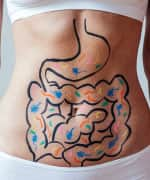Life Extension Magazine®
Bacteriophages were once recognized as powerful, lifesaving weapons against infection.1
Called phages for short, they are tiny DNA or RNA packages wrapped in protein that attack specific bacteria. They are harmless to humans and all other life forms.
Phage therapy was pushed out of the way when antibiotics were introduced. 1
As the threat of antibiotic-resistant infections grows,2 the medical establishment has begun to refocus on the potential of phage therapy.3
Mainstream media is paying attention too: The benefits and history of phages were recently explored in a feature in The New Yorker magazine.4
Scientists have found, in a laboratory study, that phages can help beneficial probiotic bacteria thrive and grow. This happens even in the presence of competitive bacteria that would otherwise suppress them.5
This may be related to the ability of specific phages to “seek and destroy.” This means they can be selected to help protect against undesirable or disease-causing bacteria.6
A combination of phages with probiotics holds great promise to promote the health of the gut microbiome and to improve intestinal function.
What are Phages?

The word bacteriophage means “bacteria eater.”
Phages are submicroscopic packages of DNA or RNA enclosed in a protein envelope that target and kill specific bacteria—and only these bacteria. Different phage strains target different bacteria. They pose no harm to any other life form, including humans.
Phages were first identified about a century ago and were used at the time to treat and prevent bacterial infections. But when antibiotics were discovered, focus shifted away from phages.4
Over time, antibiotic-resistant bacteria, also known as “super-bugs,” have developed.
Today, about 700,000 people die every year from drug-resistant infections. That number is expected to reach 10 million annually by 2050.2
This frightening reality has sparked renewed interest in phage therapy.
Phages Promote Microbiome Health
Scientists have identified a blend of four phages that may help decrease intestinal populations of undesirable bacteria while supporting probiotics.
Antibiotics employ a mass-killing technique, destroying both good and bad bacteria. But phages target only specific bacteria.
This means the right phages can target undesired or unhealthful bacteria in the gut, helping to make room for the organisms we want to flourish. The end result is that the gut microbiome can be restored to a more healthy, balanced state.6
Promoting Growth of Beneficial Probiotics

E. coli (Escherichia coli) is a normal part of our gut microbiome. Usually it is harmless, though some strains can cause diarrhea, urinary tract infections, pneumonia, and other illnesses, and also crowd out beneficial organisms.7
To determine whether the four-phage blend could promote the growth of beneficial bacteria, researchers conducted a laboratory study.
E. coli was combined with various individual probiotic bacteria in test flasks that served as the control. In separate flasks, the four-phage blend was combined with E. coli and the probiotic bacteria.5
The growth of the beneficial bacteria was measured.
In the control flasks that contained E. coli but no phage blend, the probiotic bacteria grew very poorly. It appears that E. coli inhibited their growth—in other words, it outcompeted them.
In the flasks that also contained the phage blend, the probiotic bacteria thrived.
For instance, when the healthy probiotic bacteria Bifidobacterium longum was combined with E. coli, there was little growth of the probiotic.
But in the flasks that contained the phage blend, beneficial B. longum colonies multiplied over 20 times more than in the control flasks. The phages successfully promoted the growth of the beneficial probiotic. 5
When this study was repeated using the probiotic Lactobacillus acidophilus, similar results were obtained.
L. acidophilus growth was more than 10-fold higher in the flasks containing phage plus probiotic and E. coli.
The scientists tested the phage blend again with another probiotic, this time Bifidobacterium bifidum. The result in this case was more than 30-fold higher growth, in the presence of the phages.
Phages in Mice
Researchers next studied the effectiveness and safety of this phage cocktail in live animals.
Two groups of mice were given the beneficial probiotic B. longum, along with a disease-causing E. coli strain. One group also received a phage blend specifically designed to target E. coli.8
After just 24 hours, phage treatment decreased dangerous E. coli levels by about:8
- 10-fold in the small intestine,
- 100-fold in the large intestine, and
- 100-fold in fecal matter.
What you need to know
A Probiotic-Phage Blend for Digestive Health
- Bacteriophages, or phages, target only specific bacteria. They are harmless to all other life forms, including humans.
- As antibiotic-resistant bacteria have become a growing threat, scientists are focusing on using phages to treat deadly infections.
- Scientists have now identified four phages that promote the growth of beneficial bacteria.
- This probiotic blend can help improve a wide range of digestive issues, including irritable bowel syndrome, diarrhea, bloating, and gas.
At the same time, phage treatment increased beneficial B. longum levels by about:8
- 100-fold in the small intestine,
- 100-fold in the large intestine, and
- 40-fold in fecal matter.
These results translated into clear benefits. The phage-treated mice had healthy digestive function, compared to mice infected with E. coli, and the phage was not associated with any harmful side effects.8
The mice given only E. coli and B. longum—without added phages—became constipated, and their intestines showed swelling, redness, and leaks.8
Given these results, scientists have now added this same bacteriophage blend to probiotics for humans, to boost their effectiveness.
Super-Charging Probiotics
Two qualities to look for when selecting the type of probiotic bacteria is to ensure:
- They have been studied in different combinations and shown to help improve a variety of digestive symptoms,9-19 and
- Some of the probiotic species multiplied to a much greater extent when cultured along with a specific bacteriophage blend.5
Deadly for Bacteria, Safe for You

Bacteriophages are found almost everywhere—from soil, hot springs, and the ocean depths, to the animal and human body.21
They have been successfully and safely used in several human clinical and therapeutic settings.22-24
Together with probiotics, which also have a long history of safe use, they hold promise as a powerful way to promote digestive health.
Specific probiotics have demonstrated the following benefits:
- B. longum SP54, L. paracasei IMC502, and L. rhamnosus IMC501 provide antimicrobial effects against Candida (a fungus that can cause problems when it overgrows), H. pylori (a bacteria that can cause ulcers), and E. coli.16,18,20
- B. lactis BLC1 and L. acidophilus LA1 relieve symptoms of ulcerative colitis (a disease that causes inflammation and ulcers in the colon) 12 and ease lactose intolerance.19
- B. breve Bbr8 and L. plantarum 14D reduce symptoms of celiac disease, which can include diarrhea, bloating, and gas.9,11
In addition, these probiotic strains have been shown to improve irritable bowel syndrome.9,10,12-15
Scientists have combined seven probiotic strains with a four-phage blend.
This combination holds promise for those with gastrointestinal issues and anyone searching for a way to improve digestive health.
Summary

Bacteriophages, or phages, destroy only specific bacteria. They are harmless to humans and all other life forms.
Phages were once used as a powerful weapon against deadly infections, but they were pushed aside when antibiotics were discovered.
As bacteria have developed a resistance to antibiotics, scientists have begun focusing on phage therapies again.
A four-phage blend has been shown to promote the growth of beneficial probiotic bacteria.
By combining these phages with seven specific probiotics, scientists have developed a potent way to target and improve an array of digestive issues.
If you have any questions on the scientific content of this article, please call a Life Extension® Wellness Specialist at 1-866-864-3027.
References
- Bakhshinejad B, Ghiasvand S. Bacteriophages in the human gut: Our fellow travelers throughout life and potential biomarkers of heath or disease. Virus Res. 2017 Aug 15;240:47-55.
- Available at: https://www.who.int/news/item/29-04-2019-new-report-calls-for-urgent-action-to-avert-antimicrobial-resistance-crisis. Accessed June 7, 2021.
- Keen EC. A century of phage research: bacteriophages and the shaping of modern biology. Bioessays. 2015 Jan;37(1):6-9.
- Available at: https://www.newyorker.com/magazine/2020/12/21/when-a-virus-is-the-cure. Accessed June 8, 2021.
- Supplier Internal Study. A Probiotic-Enhancing Prebiotic. Data on File.
- Mimee M, Citorik RJ, Lu TK. Microbiome therapeutics - Advances and challenges. Adv Drug Deliv Rev. 2016 Oct 1;105(Pt A):44-54.
- Available at: https://www.cdc.gov/ecoli/general/index.html. Accessed June 4, 2021.
- Supplier Internal Study. Bacteriophage Cocktail Mice Trials. Data on File.
- Francavilla R, Piccolo M, Francavilla A, et al. Clinical and Microbiological Effect of a Multispecies Probiotic Supplementation in Celiac Patients With Persistent IBS-type Symptoms: A Randomized, Double-Blind, Placebo-controlled, Multicenter Trial. J Clin Gastroenterol. 2019 Mar;53(3):e117-e25.
- Verdenelli MC, Silvi S, Cecchini C, et al. Influence of a combination of two potential probiotic strains, Lactobacillus rhamnosus IMC 501(R) and Lactobacillus paracasei IMC 502(R) on bowel habits of healthy adults. Lett Appl Microbiol. 2011 Jun;52(6):596-602.
- Cristofori F, Indrio F, Miniello VL, et al. Probiotics in Celiac Disease. Nutrients. 2018 Nov 23;10(12).
- Alm L, Ryd-Kjellen E, Setterberg G, et al. Effect of a new fermented milk product ‘CULTURA’on constipation in geriatric patients. Paper presented at: 1st Lactic Acid Bacteria Computer Conference Proceedings. Horizon Scientific Press, Norfolk, England1993.
- Black F, Andersen P, Ørskov J, et al. Prophylactic efficacy of lactobacilli on traveler’s diarrhea. Travel Medicine: Springer; 1989:333-5.
- Silvi S, Verdenelli MC, Cecchini C, et al. Probiotic-enriched foods and dietary supplement containing SYNBIO positively affects bowel habits in healthy adults: an assessment using standard statistical analysis and Support Vector Machines. Int J Food Sci Nutr. 2014 Dec;65(8):994-1002.
- Yaeshima T, Takahashi S, Matsumoto N, et al. Effect of Yogurt Containing Bifidobacterium longum BB536 on the Intestinal Environment, Fecal Characteristics and Defecation Frequency. Bioscience & Microflora. 1997;16(2):73-7.
- Coman MM, Verdenelli MC, Cecchini C, et al. In vitro evaluation of antimicrobial activity of Lactobacillus rhamnosus IMC 501((R)), Lactobacillus paracasei IMC 502((R)) and SYNBIO((R)) against pathogens. J Appl Microbiol. 2014 Aug;117(2):518-27.
- Laake KO, Bjorneklett A, Aamodt G, et al. Outcome of four weeks’ intervention with probiotics on symptoms and endoscopic appearance after surgical reconstruction with a J-configurated ileal-pouch-anal-anastomosis in ulcerative colitis. Scand J Gastroenterol. 2005 Jan;40(1):43-51.
- Namba K, Yaeshima T, Ishibashi N, et al. Inhibitory Effects ofBifidobacterium longumon EnterohemorrhagicEscherichia coliO157: H7. 2003;22(3):85-91.
- Virta PJER, Pharmacia, Finland. The Effect of a Preparation Containing Freeze-Dried Lactic Acid Bacteria [L. acidophilus LA-5 (LA-1) and Bifidobacterium TB-12] on Lactose Intolerance. 1993.
- Verdenelli MC, Cecchini C, Coman MM, et al. Impact of Probiotic SYNBIO((R)) Administered by Vaginal Suppositories in Promoting Vaginal Health of Apparently Healthy Women. Curr Microbiol. 2016 Oct;73(4):483-90.
- Dabrowska K, Switala-Jelen K, Opolski A, et al. Bacteriophage penetration in vertebrates. J Appl Microbiol. 2005;98(1):7-13.
- Sarker SA, McCallin S, Barretto C, et al. Oral T4-like phage cocktail app lication to healthy adult volunteers from Bangladesh. Virology. 2012 Dec 20;434(2):222-32.
- Bruttin A, Brussow H. Human volunteers receiving Escherichia coli phage T4 orally: a safety test of phage therapy. Antimicrob Agents Chemother. 2005 Jul;49(7):2874-8.
- McCallin S, Alam Sarker S, Barretto C, et al. Safety analysis of a Russian phage cocktail: from metagenomic analysis to oral application in healthy human subjects. Virology. 2013 Sep 1;443(2):187-96.

